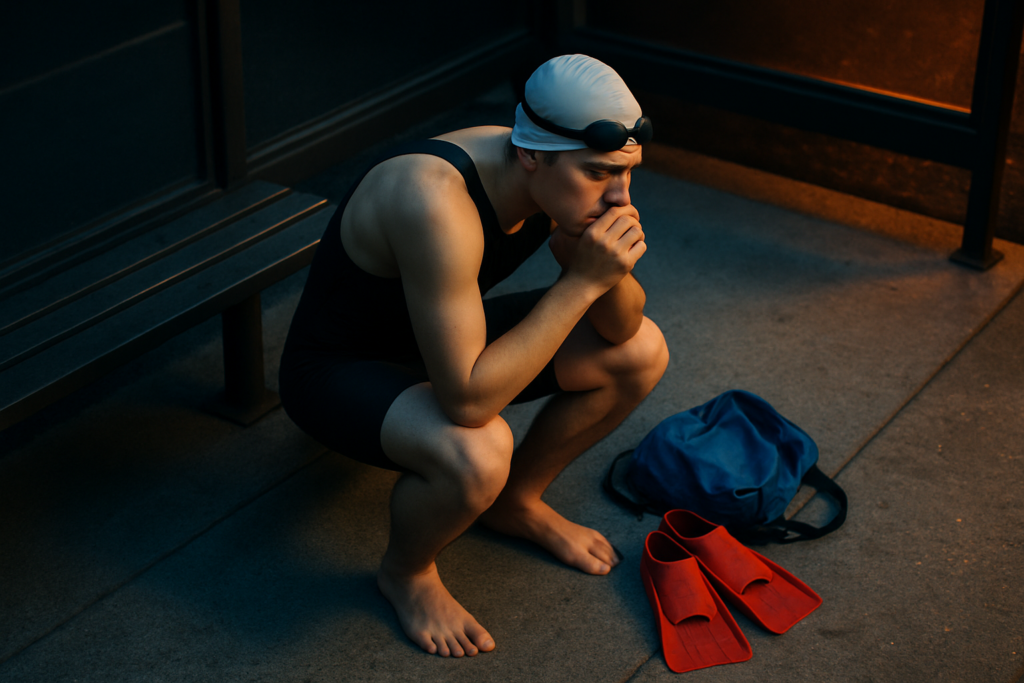As a competitive swimmer, I understand the intense pressure that comes with performing at the highest level in the pool. Overcoming performance anxiety is a challenge that many athletes face, and swimmers are no exception. The fear of underperforming or not meeting expectations can be overwhelming, affecting both physical and mental performance in the water.
In this article, I’ll share strategies and techniques to help you conquer performance anxiety and excel in competitive swimming. From visualization exercises to mindfulness techniques, I’ll provide practical tips to help you stay calm and focused during crucial moments. By implementing these tools and approaches, you can build confidence, enhance your performance, and truly enjoy the thrill of competitive swimming.
Understanding Performance Anxiety in Competitive Swimming
As a competitive swimmer, I’ve experienced firsthand the impact of performance anxiety on my races. It’s crucial to understand the root causes and signs of anxiety to effectively combat it and perform at my best.
- Signs and Symptoms of Performance Anxiety
When gearing up for a race, it’s common to experience physical and emotional signs of performance anxiety. These can include racing heartbeat, sweaty palms, negative thoughts, and a sense of dread. Recognizing these signs early allows me to implement strategies to manage them effectively. - Causes of Anxiety in Swimmers
Performance anxiety in swimmers can stem from various factors such as fear of failure, pressure to succeed, comparison to peers, or past negative experiences. Understanding the underlying causes of anxiety helps me address them proactively, allowing me to focus on my performance and enjoy the thrill of competitive swimming.
Techniques for Overcoming Performance Anxiety
When it comes to overcoming performance anxiety in competitive swimming, mental conditioning strategies and relaxation techniques play a crucial role in helping swimmers manage their anxiety levels and perform at their best.
Mental Conditioning Strategies
In my experience as a competitive swimmer, mental conditioning strategies have been instrumental in combating performance anxiety. One effective approach is setting realistic goals for each race. By breaking down larger goals into smaller, achievable milestones, I can focus on the process rather than solely on the outcome, reducing anxiety about results.
Another valuable strategy is positive self-talk. Consistently reminding myself of past successes and reinforcing a positive mindset helps counter negative thoughts that may contribute to anxiety. This practice instills confidence and mental resilience, enabling me to navigate challenging situations with a calm and composed demeanor.
Relaxation Techniques Before Competitions

Before competitions, incorporating relaxation techniques into my routine has been essential for managing pre-race nerves. One technique I find particularly beneficial is deep breathing exercises. Taking slow, deep breaths helps slow down my heart rate, relaxes my muscles, and clears my mind, fostering a sense of calmness and readiness.
Visualization is another powerful relaxation technique I utilize. By mentally rehearsing my race from start to finish, visualizing each stroke and turn with precision and success, I create a sense of familiarity and confidence that eases anxiety. This practice primes my mind and body for optimal performance, enhancing my composure when faced with the pressures of competition.
Incorporating these mental conditioning strategies and relaxation techniques into my training regimen has enabled me to confront and conquer performance anxiety, empowering me to approach competitive swimming with a focused and resilient mindset.
Role of Coaches and Trainers
In competitive swimming, coaches and trainers play a crucial role in helping athletes overcome performance anxiety. Their guidance and support can significantly impact an athlete’s mental preparedness and overall performance.
Developing a Supportive Environment
Coaches and trainers can create a supportive environment by fostering a positive and encouraging atmosphere during training sessions and competitions. They can establish open communication channels, show empathy towards athletes’ concerns, and provide constructive feedback to help swimmers build confidence.
Effective Communication Strategies
Utilizing effective communication strategies, coaches and trainers can ensure that swimmers feel heard and understood. They can actively listen to athletes’ anxieties, validate their feelings, and offer practical solutions to address performance concerns. By maintaining clear and open communication, coaches can build trust with their swimmers and empower them to navigate and conquer performance anxiety effectively.
Case Studies of Successful Anxiety Management
In this section, I’ll delve into real-life examples and insights from professional swimmers who have effectively managed performance anxiety, showcasing their strategies and the lessons learned.
Stories from Professional Swimmers
I interviewed several professional swimmers who have successfully navigated performance anxiety throughout their careers. One standout story comes from Sarah, an Olympic swimmer who found herself struggling with anxiety before major competitions. Sarah implemented a routine of visualization exercises before races, picturing herself executing the perfect swim with precision and confidence. By visualizing success repeatedly, Sarah was able to calm her nerves and improve her performance under pressure.
Another inspiring tale is that of Michael, a world champion swimmer who utilized goal-setting techniques to overcome anxiety. Michael set specific, achievable goals for each race, focusing on his personal progress rather than external expectations. By breaking down his objectives into smaller milestones, Michael tackled his anxiety by approaching competition one step at a time, leading to greater self-assurance and improved results.
Lessons Learned and Best Practices
From these stories, I gleaned valuable lessons and best practices for managing performance anxiety in competitive swimming. One key takeaway is the effectiveness of mental rehearsal through visualization techniques, as demonstrated by Sarah. By mentally preparing for races and envisioning success, swimmers can instill confidence and reduce anxiety levels.
Additionally, the importance of setting realistic and measurable goals, highlighted by Michael’s experience, cannot be overstated. Setting personal targets based on individual progression fosters a sense of achievement and control, mitigating the impact of performance pressure.
Overall, these case studies emphasize the significance of incorporating mental strategies and goal-oriented approaches in anxiety management for competitive swimmers. By learning from successful athletes and adopting proven techniques, swimmers can enhance their mental resilience and optimize their performance outcomes.


 is a seasoned fitness expert with a special focus on swimming and holistic health strategies. With years of experience as a competitive swimmer and fitness coach, Patricia offers readers a wealth of knowledge on optimizing performance and maintaining a balanced lifestyle. Her writing on Swim Fast Stay Fit reflects her commitment to empowering others with practical advice and motivational insights. Patricia’s approach integrates advanced training techniques with accessible wellness tips, aiming to help individuals achieve their personal fitness goals and enhance their overall quality of life. Through her engaging articles, Patricia inspires readers to embrace a comprehensive approach to health, combining effective exercise routines with mindful nutrition and self-care practices.
is a seasoned fitness expert with a special focus on swimming and holistic health strategies. With years of experience as a competitive swimmer and fitness coach, Patricia offers readers a wealth of knowledge on optimizing performance and maintaining a balanced lifestyle. Her writing on Swim Fast Stay Fit reflects her commitment to empowering others with practical advice and motivational insights. Patricia’s approach integrates advanced training techniques with accessible wellness tips, aiming to help individuals achieve their personal fitness goals and enhance their overall quality of life. Through her engaging articles, Patricia inspires readers to embrace a comprehensive approach to health, combining effective exercise routines with mindful nutrition and self-care practices.
